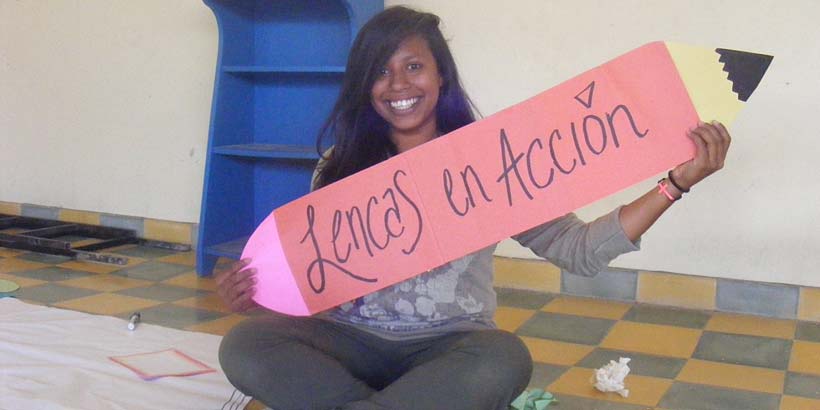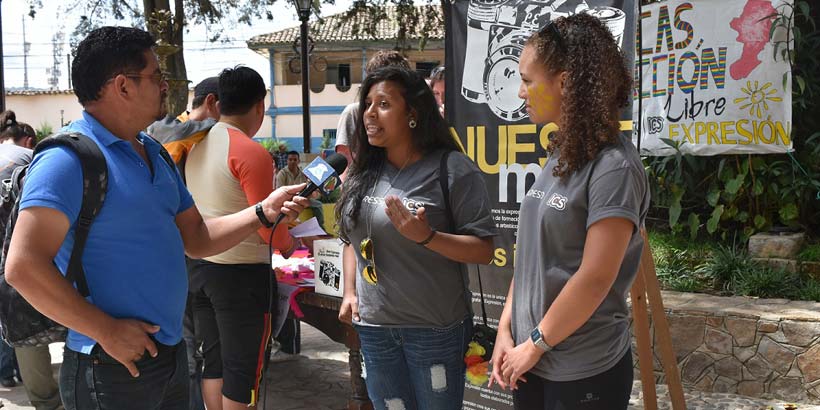Over here in sunny La Esperanza we have been lucky enough to be working alongside a group of wonderful national volunteers, both from the local community in La Esperanza and the capital Tegucigalpa. Working with the national volunteers over the last few weeks it has struck me how their volunteering experience differs from ours. In our 5th week now and we UK volunteers still have much to learn about this alien culture, we are still getting used to a diet of refried beans and continue to battle daily with the depths of Spanish grammar. However, at the end of our placement sadly this will all be left behind us and our work that we have carried out here could not be further removed from our daily lives back in the UK. On the other hand the Honduran volunteers are carrying out work within their own culture and country. Not only this but many of them are working within their own community where they, and their parents before them, grew up. Once returned to the UK in five weeks’ time we can only hope that our project will have a lasting impact in the future. However, the national volunteers are either living with the effects of our project on their doorstep or looking to such projects to shape the future of their country.
With this in mind, I wanted to get an insight into a volunteering experience from a national volunteer’s point of view and therefore decided to interview Jenny Carolina Zelaya, one of our Honduran volunteers. Jenny is 24 years old, recently graduated from the Universidad Nacional in Social Work and lives in the capital Tegucigalpa with her mother, two brothers and grandmother. She kindly agreed to put up with my stilted Spanish interview as I endeavoured to find out her views on our women empowerment project, its importance in Honduras and her impressions of the UK volunteers.

Why did you sign up to do Progressio ICS?
I’m really interested in volunteering because I want to help others. When I saw the opportunity to volunteer in La Esperanza with the Lenca community it caught my attention. I was motivated to come and support this cause, which to me seemed to suit my personality. This is because I love working with indigenous communities, with women and obviously was really interested in working alongside volunteers from abroad.
When I found out I would be volunteering in Honduras I was personally a little apprehensive due to the security issues I had heard about in Honduras. What would you say to a UK volunteer who is in the same position?
Foreign television, radio, internet and other media does give Honduras a bad reputation. It is true that there is much insecurity and many deaths of young people, women, men and children every day. However, in Honduras we are tired of the fact that everyday someone dies and that the many of those killed are young people. We are the future of Honduras and we are dying. This is why we need other people from around the world to help us find and reinforce solutions to these problems, which we cannot solve ourselves.
Also I would recommend to UK volunteers to come to Honduras because you do not want to miss out on the opportunity to get to know the culture of our country. Honduras is not just about insecurity because there are many beautiful places, the people are good and kind and passionate about what they do. There are divine views, blue skies and big green mountains. There is a huge amount of potential in Honduras that you do not want to miss out on. The media will never tell you of the beautiful things and will always encourage fear, meaning that it could act as an obstacle to your dreams coming true. There is so much to learn in Honduras and the opportunity to do something different in a new place.
What do you think is the biggest challenge facing women in Honduras today?
There are lots of barriers that women in Honduras have to battle against but probably the biggest problem is that they are not able to enjoy the same freedoms as men. For Honduran women there is a struggle for education, a struggle for a job and a struggle for the same rights as men. There are thousands of feminist movements working for women’s rights in Honduras and some have had some success. However, we need to change the mentality of the population, which thinks that we women are only destined for the home. Women need to have other options, other roles within society that demonstrate our importance.

How important is the project we are doing here in La Esperanza for the women we are working with?
This project is very important because the opportunities for women living in cities and those living in more rural areas, like here in La Esperanza, are very different. In the city women can go to work and have their own independence. Elsewhere women are tied down to their home and their children. These are the women that we need to empower. In this project we are not just working with women from the local rural villages but the indigenous women of the Lenca community who make up an essential part of the Honduran culture. It is so important to work with these women and show them that they do not have to be bound to their homes but can have important roles within their communities. They do not just have to act within the shadow of someone else.
What is the difference between the communities we are working in here in La Esperanza and your home in Tegucigalpa?
It’s totally different! In Tegucigalpa you will not find the sky as beautiful as it is here in La Esperanza. In the city there is contamination and a mountain of cars and people, which makes it more stressful and gives a much faster pace of life. In La Esperanza it is much calmer and there is not the same insecurity issue as in Tegucigalpa. There is also a lot more freedom for people; they have a lot more mobility. Here in La Esperanza we are a lot closer to nature, we can see cows! In the capital all we can see is buildings and people running here and there. To come to La Esperanza for two months is like taking a break from all the disorder of my home city.
What is the biggest cultural difference you have noticed between the Honduran and the UK volunteers?
I believe it is our attitude towards food because it seems that food forms a much more important part of Honduran culture than it does in the UK. Also our dancing is very different, the UK volunteers’ dancing looks to us less natural, and it seems much more rigid! Although we are different we are coming together to help another culture - the Lenca culture.
And finally what is the strangest thing about the UK volunteers?
The strangest thing about them is that they like to be in the sun all the time until they burn. It is funny to see them go red!
Written by ICS volunteer Sally Tuson



